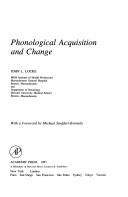| Listing 1 - 8 of 8 |
Sort by
|
Multi
ISBN: 9780521887137 0521887135 9780511993404 9781139127059 1139127055 1139114220 9781139114226 0511993404 9781139116398 1139116398 128329558X 9781283295581 1139112031 9781139112031 0511993404 1139124080 9781139124089 1107219221 9781107219229 9786613295583 6613295582 1139122134 9781139122139 Year: 2011 Publisher: Cambridge, UK ; New York : Cambridge University Press,
Abstract | Keywords | Export | Availability | Bookmark
 Loading...
Loading...Choose an application
- Reference Manager
- EndNote
- RefWorks (Direct export to RefWorks)
"Why do men and women talk so differently? And how do these differences interfere with communication between the sexes? In search of an answer to these and other questions, John Locke takes the reader on a fascinating journey, from human evolution through ancient history to the present, revealing why men speak as they do when attempting to impress or seduce women, and why women adopt a very different way of talking when bonding with each other, or discussing rivals. When men talk to men, Locke argues, they frequently engage in a type of 'dueling', locking verbal horns with their rivals in a way that enables them to compete for the things they need, mainly status and sex. By contrast, much of women's talk sounds more like a verbal 'duet', a harmonious way of achieving their goals by sharing intimate thoughts and feelings in private"--
Sociolinguistics --- Pragmatics --- Conversation analysis. --- Oral communication --- Sex differences. --- Analysis of conversation --- CA (Interpersonal communication) --- Conversational analysis --- Oral transmission --- Speech communication --- Verbal communication --- Communication --- Arts and Humanities --- Language & Linguistics --- Gender --- History --- Sex --- Gender roles --- Language use --- Theory --- Book --- Sex differences

ISBN: 0124541801 9780124541801 Year: 1983 Publisher: New York, NY : Academic Press,
Abstract | Keywords | Export | Availability | Bookmark
 Loading...
Loading...Choose an application
- Reference Manager
- EndNote
- RefWorks (Direct export to RefWorks)
Linguistic change --- Language acquisition --- Grammar, Comparative and general --- Phonology --- -Language acquisition --- KVH-BOM --- #KVHB:Fonologie --- #KVHB:Taalontwikkeling --- Change, Linguistic --- Language change --- Historical linguistics --- Language and languages --- Acquisition of language --- Developmental linguistics --- Developmental psycholinguistics --- Language development in children --- Psycholinguistics, Developmental --- Interpersonal communication in children --- Psycholinguistics --- Comparative grammar --- Grammar --- Grammar, Philosophical --- Grammar, Universal --- Philosophical grammar --- Linguistics --- Philology --- Acquisition --- Grammar, Comparative --- Language acquisition. --- Linguistic change. --- Language development. --- Phonetics. --- Speech --- Phonology. --- In infancy and childhood. --- Grammar, Comparative and general - Phonology --- Grammar, Comparative and general Phonology
Book
ISBN: 9780199236138 0199236135 Year: 2010 Publisher: Oxford Oxford University Press
Abstract | Keywords | Export | Availability | Bookmark
 Loading...
Loading...Choose an application
- Reference Manager
- EndNote
- RefWorks (Direct export to RefWorks)
Communication --- Eavesdropping --- Sociolinguistics --- Psychological aspects --- History --- Psycholinguistics --- Historical linguistics --- Communication - Psychological aspects --- Eavesdropping - History --- Eavesdropping - Psychological aspects
Book
Year: 1983 Publisher: New York
Abstract | Keywords | Export | Availability | Bookmark
 Loading...
Loading...Choose an application
- Reference Manager
- EndNote
- RefWorks (Direct export to RefWorks)

ISBN: 0684843331 Year: 1998 Publisher: New York (N.Y.): Simon and Schuster
Abstract | Keywords | Export | Availability | Bookmark
 Loading...
Loading...Choose an application
- Reference Manager
- EndNote
- RefWorks (Direct export to RefWorks)
Book
ISBN: 0674116399 Year: 1995 Publisher: Cambridge (Mass.): Harvard university press
Abstract | Keywords | Export | Availability | Bookmark
 Loading...
Loading...Choose an application
- Reference Manager
- EndNote
- RefWorks (Direct export to RefWorks)
Book
ISBN: 0191613665 1282613286 9786612613289 0191576190 9780191576195 9780199236138 0199236135 Year: 2010 Publisher: Oxford Oxford University Press
Abstract | Keywords | Export | Availability | Bookmark
 Loading...
Loading...Choose an application
- Reference Manager
- EndNote
- RefWorks (Direct export to RefWorks)
Why we can't resist listening in on our neighboursEavesdropping has a bad name. It is a form of human communication in which the information gained is stolen, and where such words as cheating and spying come into play. But eavesdropping may also be an attempt to understand what goes on in the lives of others so as to know better how to live one's own. John Locke's entertaining and disturbing account explores everything from sixteenth-century voyeurism to Hitchcock's 'Rear Window'; from chimpanzee behaviour to Parisian caf--eacute--; society; fromprivate eyes to Facebook and Twitter. He uncover

ISBN: 0126529752 Year: 1988 Publisher: San Diego : Academic Press,
Abstract | Keywords | Export | Availability | Bookmark
 Loading...
Loading...Choose an application
- Reference Manager
- EndNote
- RefWorks (Direct export to RefWorks)
Language acquisition --- Vocabulary --- English language --- Word books --- Words, Stock of --- Diction --- Lexicology --- Acquisition of language --- Developmental linguistics --- Developmental psycholinguistics --- Language and languages --- Language development in children --- Psycholinguistics, Developmental --- Interpersonal communication in children --- Psycholinguistics --- Acquisition
| Listing 1 - 8 of 8 |
Sort by
|

 Search
Search Feedback
Feedback About UniCat
About UniCat  Help
Help News
News